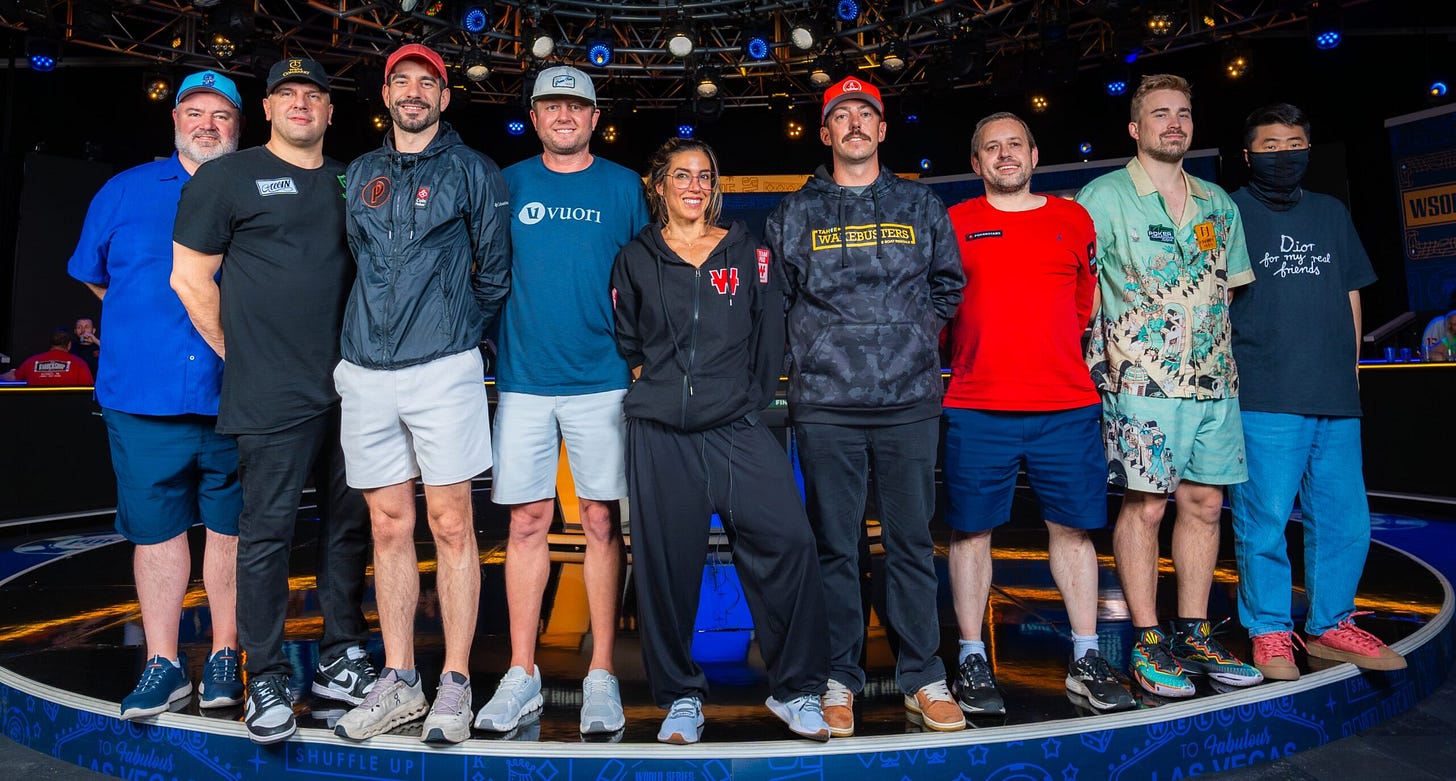The Final Table
The World Series of Poker Main Event
The final table of the WSOP main event starts tomorrow, July 15, 1:30PM Las Vegas time. I will be watching it on PokerGo.com, which, like all streaming services, is a nightmare beyond comprehension from which I cannot awake, but also fine. I think you can probably just watch it on YouTube?
This is, as these things go, a very good final table. Most notably, it features Leonor Margets, who is the first woman to reach the final table of the main event in 30 years. Margets is a Poker pro from Spain who seems super cool, and it would be amazing if she were to win it all. It’s always nice to see women succeed in Poker, there are several successful women Poker players here on Substack.
Since 1995, when Barbara Enright made the final table, around 3% - 4% of the main event entrants have been women. Given the assumption that, on average, women players have the same chance of reaching the FT as men, then these results are pretty disappointing. We should have been seeing a woman at the FT about once every 4 - 5 years. Poor results are usually a combination of running bad and playing bad. A Margets victory this week will go some ways towards updating us that it has mostly been the former. Also, LOL sample size.
Also, talent in Poker is weird, as it is in every game. We have a kind of intuitive sense that game results are a measure of skill, and, in of course, in one sense, they are. But, as measurements, they are extremely Goodhartian - they don’t simply measure the amount of some pre-existing quantity, instead they are part of a system that generates that quantity. People decide to get good at a game, and any serious competitive game is more of a measurement of maniacal, single-minded commitment to acing the test than it is a measurement of some innate ability. I suspect that a Margets win would lead to improved results for women players overall, because of what are essentially network effects - more women being inspired to play the game more seriously and push themselves harder for better results.
Speaking of maniacal, single-minded commitment, another reason this is a good final table is the presence of Michael “The Grinder” Mizrachi (second from left in the above photo) who also made the final table in 2017. It’s always fun when a well-known pro makes the FT. Again, from a statistical perspective, it’s nice to be able to point to repeated success as a demonstration of the skill-component of the game. If Poker were a game of pure chance, the odds of any individual player making it to the final table twice over that period are something like 9,000 to 1.
Also, vibes-wise, it’s a nice table, a bit less generic Poker-bro than we’ve gotten used to in the last few years. The other big story this year was Will Kassouf, the motormouth heel whose constant testing of the unwritten rules of allowed behavior made for some compelling, if extremely unpleasant viewing. Unlike Jamie King, whose speech play could be somewhat annoying but was always genuinely interesting and entertaining, or Phil Hellmuth, whose antics make him a Poker villain that everyone loves to hate, Kassouf’s behavior was unrelentingly excruciating, and a huge bummer. I think we’re lucky he didn’t make the final table, but I also hope he’s doing ok, because it genuinely seems like he’s not well. (Leave it to games, and especially Poker, to provide an experimental framework for thinking about the theoretical difference between being unwell and just being an asshole.) Anyway, it’s almost like Kassouf’s antics caused everyone else at the tournament to recognize and appreciate the value of being nice, and there’s a good sense of camaraderie among these final 9 players.
Finally, if, on either day, the action goes late, then get ready to enjoy the best thing about the WSOP, the Night Shift, featuring commentators Ali Nejad and Nick Schulman. Not only is their personal dynamic the perfect complement to the long stretches of punctuated equilibrium that is a Poker game, but Schulman’s insight into the game is a great way to get a taste of how the best players currently think, in terms of ranges, mixed strategies, and “blockers” - cards in your own hand that influence what decisions you might make in close situations. These guys are the main reason that Poker is one of the best sports on TV.



Weirdly, if you asked me to make a list of living professional poker players I could name, women would easily outnumber men! Not entirely sure why, compared to something like chess. Maybe the '00s poker boom just meant increased visibility for interesting and telegenic people like Annie Duke (who also 'stacks now apparently), idk.
In any case multiple people have told me that I should stake out a career as a poker player, which is very funny to me (a girl bad at math AND interpreting other people's emotions) but which still feels tempting. I feel slightly less bad about being so ignorant relative to with chess, though.
Hey Frank. This is a bit tangental, but I'm curious if you've seen The Card Counter, Paul Schrader's rather bleak film about a professional Poker player who used to be soldier stationed at Guatanamo Bay?